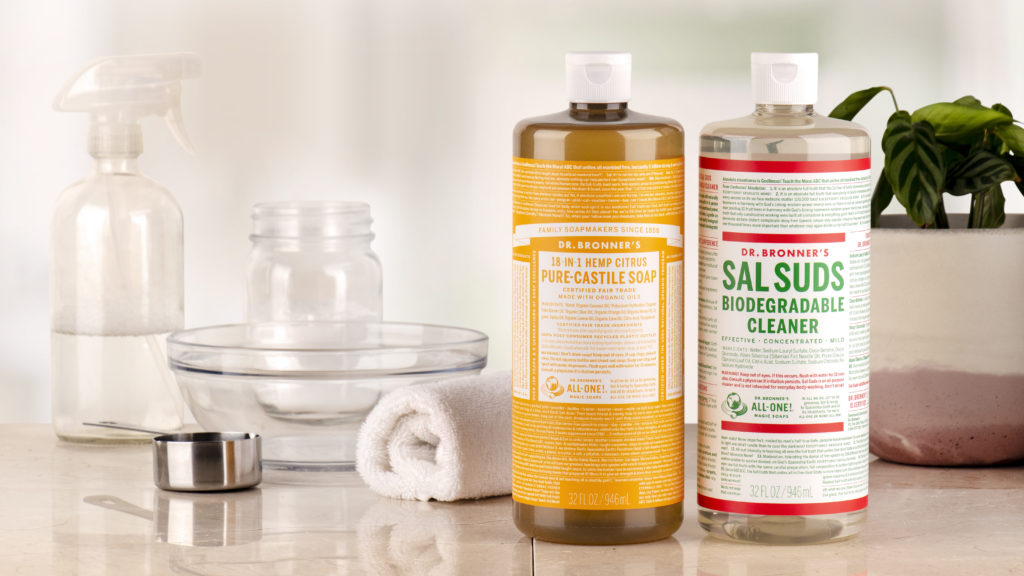
Sticks and Stones may break my bones, but my morning coffee can eat that marble countertop for breakfast.
It might seem that stone is stone is stone – it’s all hard and cold and hurts when you drop it on your foot. But stone types differ. Depending on their origins and their compositions, some stone types are seemingly impervious, while others are quite soft.
When it comes to usage and cleaning stone, you have to know your stone, lest it become dull, stained or etched.
Harder stones include granite, sandstone, quartzite, soapstone, brownstone, and bluestone. These are Siliceous stones. They don’t etch or stain as easily.
Marble, travertine, limestone, and onyx are soft stones – called Calcareous stones. (I’m glad I’m only typing this and not saying it. Are both of those a hard C sound?) Alabaster is another very soft stone, but if you have alabaster countertops or floors in the house that you actually live in, invite me over. I want to see it. Then I’ll tiptoe out, very gently. In my socks.
These latter soft stones are sensitive for three reasons:
- They are full of holes (porous) so liquids easily find pathways into them, resulting in stains.
- They are soft and compress under moderate pressure, even from tiny things like the dirt on the bottom of our shoes or baking soda in a Green-It-Yourself (GIY) soft scrub.
- They dissolve in acids, such as those found in many foods – wine, coffee, soda, vinegar, some fruits– and many cleaners. (A key note for GIY-ers: Put that vinegar & water spray away. That will eat your marble.)
“But Aha!” you say. “My travertine is SEALED!” Sealant protects stone from stains but also gives a false sense of security. The stone can still easily be etched and scratched and as well as discolor. Take care.
Having heard all these do’s and don’ts before, I wanted to make sure it wasn’t just hype and hysteria. I happen to have a 12” square marble tile on hand (who doesn’t?) and did some tests with what I could find in my kitchen. Root beer caused a little roughness in the polished surface. Red wine caused even more roughness and some discoloration. Vinegar was the most striking and ate a well-defined circle in the surface. The danger is real.
Let me pause here to say, I’m not anti-marble. I had the joy of seeing this phenomenal statue with my own eyes. Doesn’t it look like a breath of wind would blow those veils aside? You simply can’t make this out of granite:
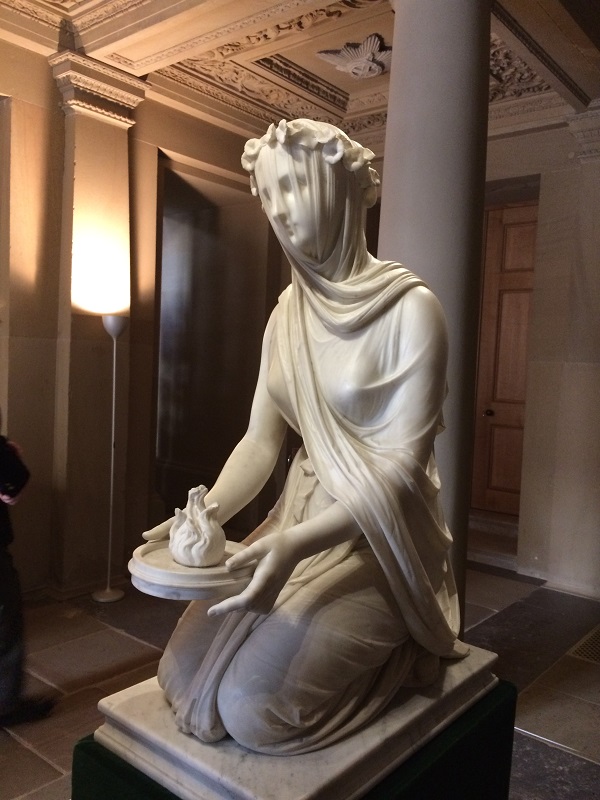
It’s gorgeous. But it terrifies me from a “my-house-would-never-ever-be-clean” mindset. And that’s not even taking into consideration kids and a particularly exuberant, nose-less black dog. However, don’t let me deter you from your marble floors. I am so very glad there are people in this world who can keep delicate things beautiful. I appreciate you and what you do.
Cleaning stone – soft stone
Prevention is of course key. Wipe up spills immediately and keep grit off floors as much as possible. Use coasters and trivets for food and beverage. Use damp mops to pick up loose dirt and lint as opposed to dragging vacuums. But at some point, you actually want to clean the stone.
Dr. Bronner’s Castile Soap and Sal Suds are perfect for this. Not only are they both effective cleaners, but once diluted as in the All-Purpose sprays below, they create a near neutral solution. This means that the pH of the spray is near 7, making it a mild cleaner for all manner of stone.
With the Castile Liquid soap, make up a bottle of my All-Purpose Castile Cleaning Spray, with 1/4 c. (60 mL) of your favorite Castile soap and 1 qt. (1 L) of water. Spray the surface and wipe with a damp microfiber cloth. For mopping, use 1/2 c. (120 mL) of Castile soap in a 3-gallon (12 L) mop bucket. Use a damp microfiber mop.
Sal Suds, a mild detergent, is also alkaline and completely safe on stone of all types. For a Sal Suds All-Purpose Spray, use 1 Tbsp. (15 mL) of Sal Suds in 1 quart (1 L) of water. For mopping, use ½ Tbsp. (7.5 mL) Sal Suds in a 3-gallon (12 L) mop bucket.
This is it. No scrubbies. No powders. Not even soft scrub gels, which are powders suspended in liquids. All of these can etch that surface. Be assured that soap is enough. It will remove the grime and germs and leave behind a clean surface.
I’m talking primarily about soft stones here, but hard stones can use a little mindful TLC as well. While the stakes are not as high, because they are not as easily affected, they still are a bit porous, etchable, and have some sensitivity to acids.
So far, I’ve talked about prevention and maintenance, and not remedies for stains and etches that have already happened. Like when your sweet neighbor set her wine glass on your marble coffee table without a coaster and you spent the evening agonizing between the rudeness of directly handing her a coaster versus the effort of fixing the problem afterwards.
Just now, I did the tiniest bit of research and there are potential remedies. There are fascinating poultices you can concoct with corn starch or baking soda (don’t rub it though) and various liquids, which you gently spread on, cover with plastic wrap, and let sit for 24 hours. The very word “poultice” sounds like I’m channeling my inner medicine woman. Happily, there are also experts you can consult to fix serious marring. I am not an expert in soft stones. Think of me more as a sign post. Check out the Natural Stone Institute.
Next time, hand your neighbor the coaster while telling her the fascinating story of how you acquired it while on an expedition to the tea hills of Sri Lanka. That’ll distract her from any perceived rudeness.
It’s strange to be talking about vinegar and baking soda like they’re some sort of nefarious mischief-makers. They are, after all, heroes of the green cleaning arsenal. But not here.
Even though marble still hurts abominably when you plow into its corner in the dark because it’s bedtime and you left your cell phone, which is your alarm clock, in the kitchen, where you’ve already turned the light off and don’t want the expense of turning it back on, and you’ve forgotten how to use the digital alarm clock on your nightstand, and if the power happened to go out, that one wouldn’t work anyway. Even considering how much that corner in the dark can hurt, something as common as vinegar and baking soda, as well as many conventional cleaning products, will mar your marble.
Holster them for now and stick with Castile Soap or Sal Suds.
Further reading
- Mopping with Dr. Bronner’s Castile Soap or Sal Suds
- Green Cleaning Mirrors, Windows & Screens
- Cleaning Carpets with Sal Suds & Castile Soap
- Cleaning Stainless Steel With Dr. Bronner’s
Sal Suds cleaner shows >60% biodegradation after 28 days per ISO 14593.
This use and many more are in my book, Soap & Soul: A Practical Guide to Minding Your Home, Your Body, and Your Spirit with Dr. Bronner’s Magic Soaps, available now in hardback on DrBronner.com or at your favorite bookseller, and as an eBook and audiobook (read by me!) from wherever you download or listen.

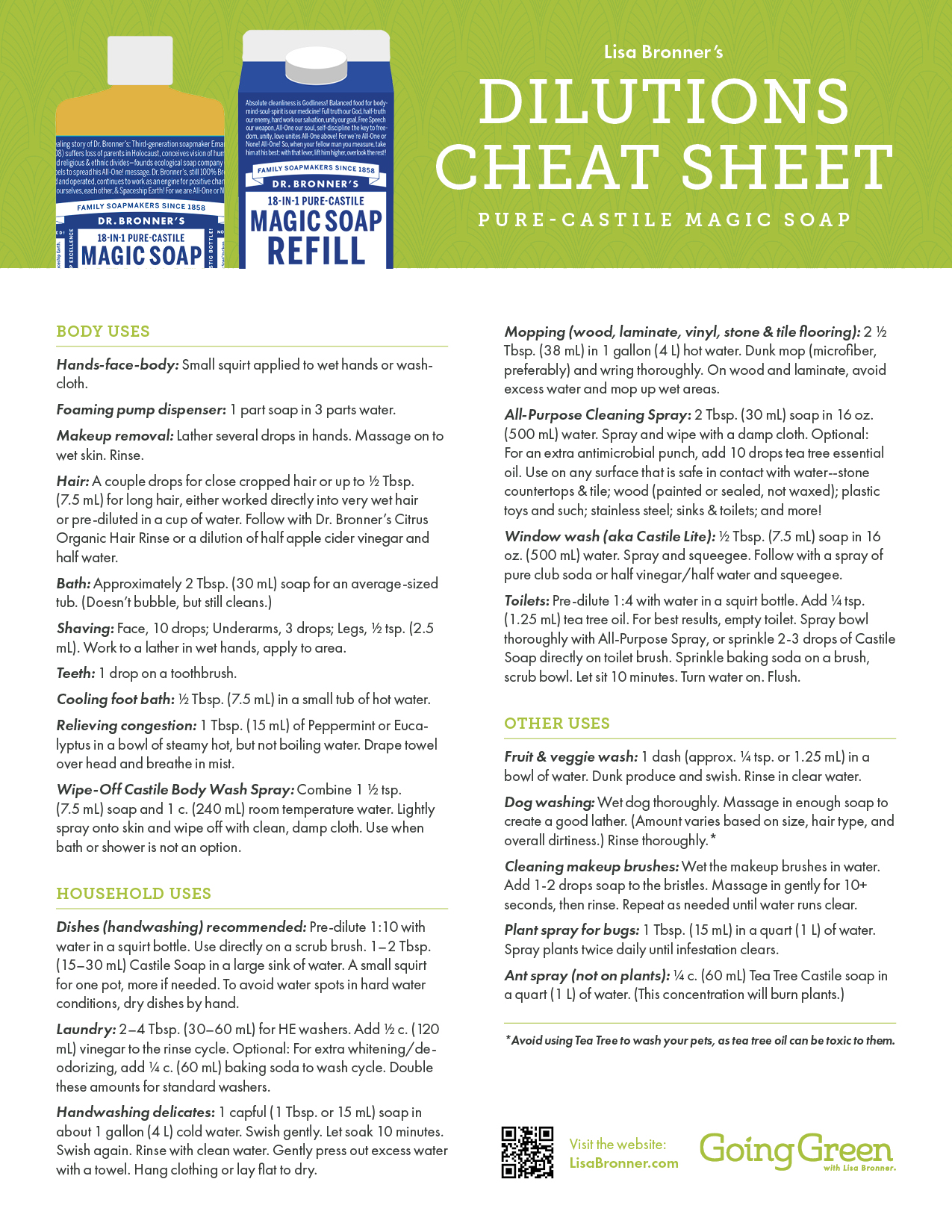
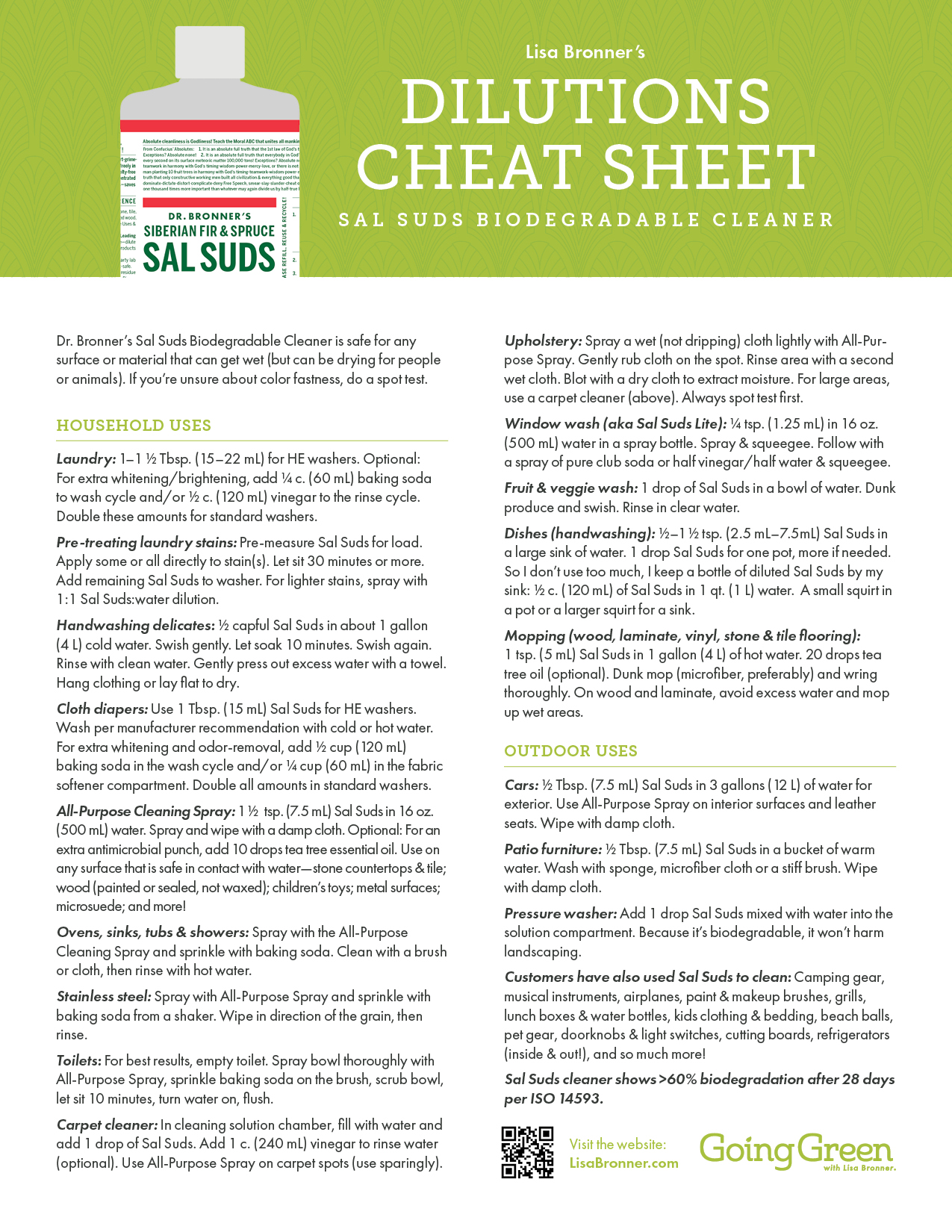
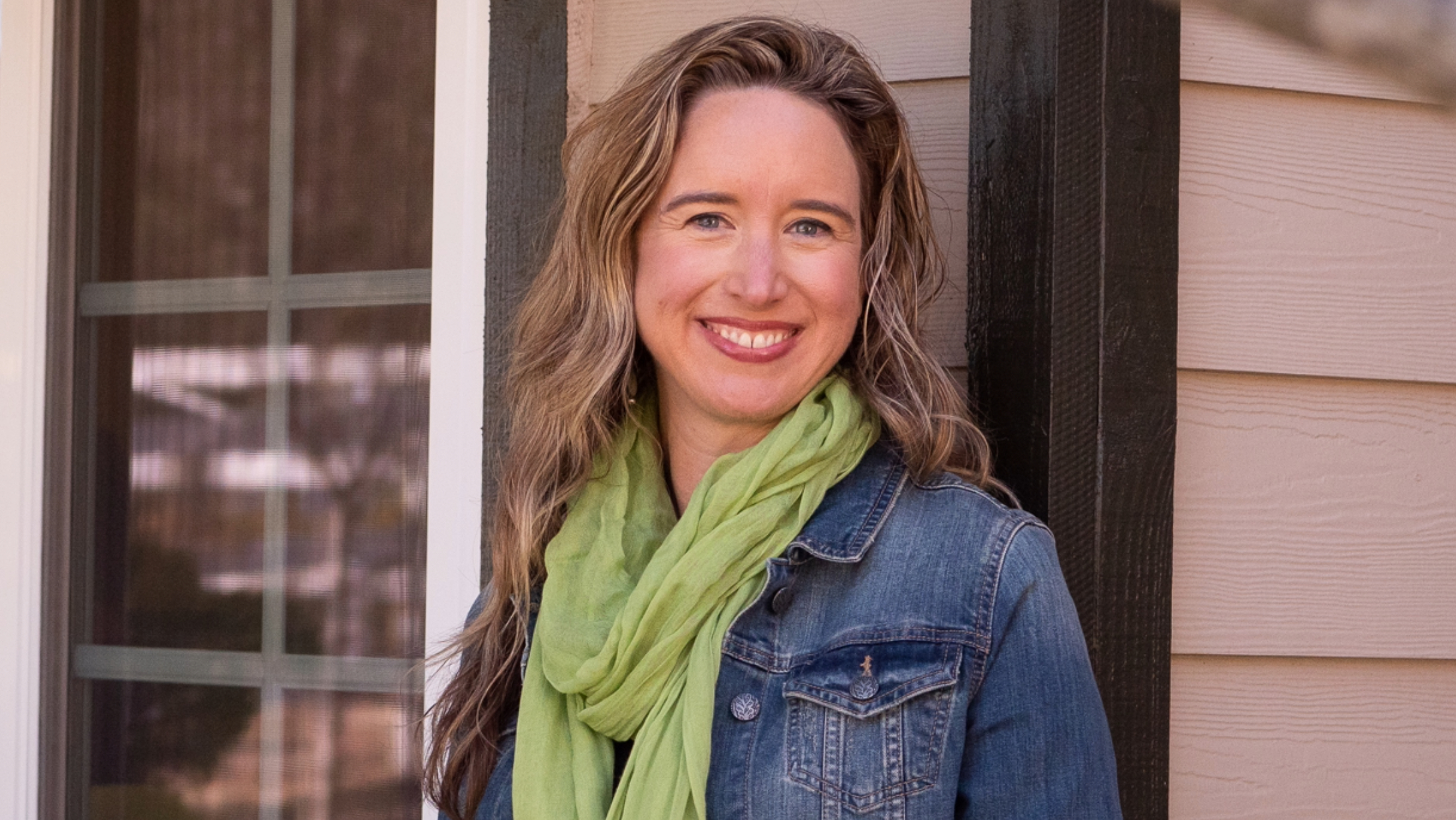
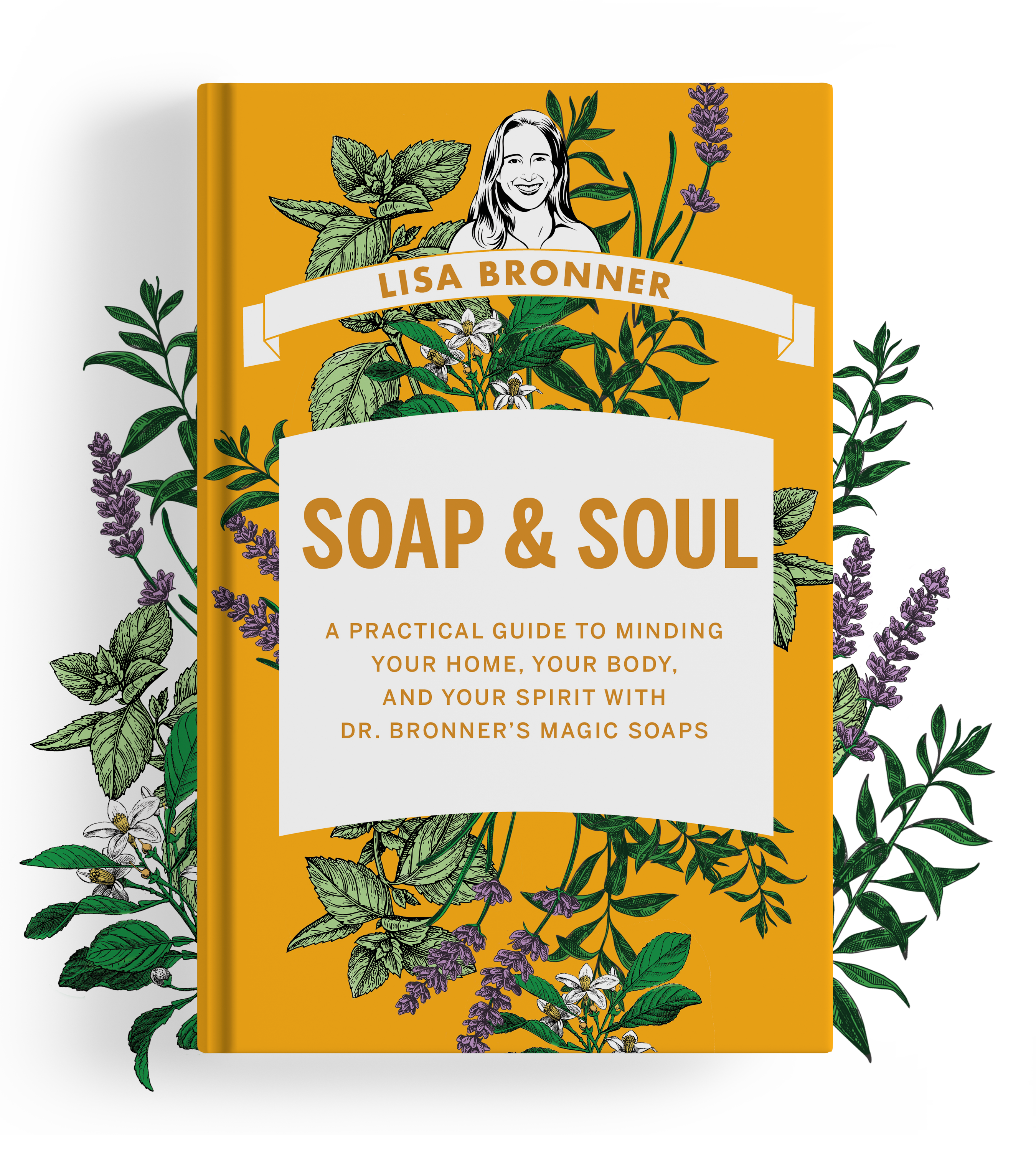
I am a friend of Kim’s since back when I was volunteering at the wildlife rehab facility in Ramona, and I had a feeling your soap would be perfect for cleaning the counters and dining room table in my new house, and sho nuff! I know you make good stuff!
Hi Beverly – Very nice to hear from you. I’m glad the Magic Soap is working well for you!
Hello, I was told that I can not use citric acid on my cultured marble shower and vanity. You say that Dr. Bronners is alkaline. How is it alkaline with citric acid in it? I can not find any products without citric acid, vinegar, baking soda, etc…to clean my shower and vanity. Are you sure Dr. Bronners is safe for cultured marble, even with citric acid as an ingredient. I was planning to use the unscented which has these ingredients: Water, Saponified Organic Coconut & Organic Olive Oils (w/ Retained Glycerin), Organic Hemp Oil, Organic Jojoba Oil, Citric Acid, Vitamin E. Thanks!
Hi Gloria- Thanks for your comment. It’s so difficult sometimes to know what to use and where! The purpose of the citric acid is to make our soap more gentle by balancing out the pH. It does this by neutralizing any unreacted hydroxide that’s left over from the saponification, or soapmaking, reaction. Each batch of soap is carefully tested to see how much alkali remains, and then just enough citric acid is added to catch that alkali. The pH of our Castile Soaps is 8.7 – 9.9, which is just on the alkali side of neutral before being diluted as it used when cleaning.
I had a 4×4 inch and a 5×5 inch pieces of marble specially made which is listed below with holes to drain water to sprout seeds like broccoli, alfalfa, lentils, etc. it sits on there for a few days and grows.
Is the unscented baby dr bronner OK? I was thinking of putting 1 or 2 squirts in a quart bowl of water and clean it that way vs. a spray bottle because I was told the water goes bad in 2-4 weeks and then I have to dump out the water/dr bronner. TRUE?
It has a 511 sealer on it.
I read you said 6months to a year to reseal. Do I do this with these pieces in that time frame?
would you recommend a food grade sealer that is safe?
Bianco Carrara Marble a rich creamy white grey with blue accents, It is quarried in the city of Carrara in the province of Massa and Carrara in the Lunigiana, the northernmost tip of modern-day Tuscany, Italy.
Dynasty Cream Marble amethyst blue, amethyst marble
mild, pH-neutral(ph 7), non-abrasive soap
Hi Angelica – Sounds like you will have a gorgeous garden! I am not familiar with this use for marble, but I can share some thoughts. I think washing these pieces of marble in a solution with the Unscented Castile would be fine. Regarding the spray solution going bad, I haven’t found that they go bad in that 2-4 week timeline. My recommendation on resealing marble is for countertops, but it sounds like these pieces of marble you are using will get much more use than a countertop – as far as being in contact with soil and water. They may need a more rigorous treatment, but again, I am unfamiliar with this technique for sprouting seeds. I definitely would use a food safe sealer as you don’t want toxins leeching into the soil and the plants.
Lisa it is great to meet you.. I love Dr Bronner using it for years. I am sprouting with just water no soil. I sprout alfalfa, broccoli, peas, etc. I put the seeds on this tray and water it daily and cover it until they sprout WALLA… so I thought putting water in a quart glass bowl and squirting one or two drops of the unscented and then washing the marble pieces with a cloth when I notice it needs a deeper cleaning then just water. 511 sealers become food safe after they are complete. wanted to find some suggestions .. thanks for the care in reply.
Hi Lisa,
Would you have any recommendations for cultured marble bathroom sink and counters? I can’t seem to find anything on the internet about DIY solutions, rather a push on buying Gel Gloss, a commercial cleaner to maintain the gel coating. Not sure how that helps when needing to disinfect bathroom surfaces. Any advice on a solution that won’t degrade the gel coating?
Hi Samira – From what I’m finding, cultured marble is made from a mixture of resin and marble dust. While it is more durable than natural marble, it still can be etched or dulled by abrasive cleaning. Avoid using any sort of soft scrub or powder on it. Also, as with marble itself, avoid anything acidic (vinegar) or anything that is a solvent (alcohol). The gel coating is a sealer that should be applied every 6-12 months. A mild soap or detergent will not degrade the gel coating, so you will be fine using either the Castile or Sal Suds on it according to the dilution in the above article.
Your cleaner contains citric acid and potassium hydrochloride. How can it be alkaline and safe for soft stone?
Hi Glenda- Excellent question! It’s great that you read ingredient lists so closely. Both the citric acid and potassium hydroxide are used as pH adjusters in Sal Suds. The pH of each batch of Sal Suds is tested and then one or the other are added if needed to ensure the final product is a moderately alkaline pH. While we don’t use these ingredients with every batch, we do include them both in the ingredient list.
I have a marble counter in my kitchen and I had Bronner’s soap diluted in a soap dispenser by the sink. When the soap would squirt out it would get on the counter. I would wipe it up, but it left a residue. My fabricator said I can not use soap with acids or oil based. However, you mention it’s ok to use… Do you have a suggestion? They said the oil and acid will stain and eat away at the finish.
Hi Renee- All true soaps, like our Castile Soap, are alkaline and all are oil-based. Your fabricator is correct that you should not use acids on marble as it is a very soft stone and easily etched by acids. However, if you want to prevent the squirting, a foaming pump dispenser works really well. Dilute the Castile Soap at a ratio of 1 part soap to 3 parts water.
I keep reading that washing granite countertops with any soap product will lead to them being dull very soon. So, won’t the SalSuds or Castile Soap solution cause this dulling to the shiny finish before long? (JUST had new granite tops installed and HATE the thought of buying some “special” cleaner from now on!! And I’m a life-long fan and user of your Dr. Bronner products!!)
Hi Ann – I’m very sorry for having overlooked your question from September. It is easiest for granite specialists to make broad statements, especially when they have a particular product to recommend. The issue they are warning against is using a product with a high pH, and many soaps do have a pH that veers up the scale. The undiluted Castile soap has a pH of around 9.0, which is not much higher than most of our tap water. (It’s a total myth that water as we experience it is a neutral 7 – it’s always packed with ions that impact its pH, usually well into the alkaline.) When you dilute the Sal Suds and the Castile at the levels I recommend, the pH comes down pretty close to whatever the water was. This will not dull or etch your counters. Use a soft cloth and no abrasives. Dry them well with a soft cloth. Regularly seal them as recommended by the manufacturer. (I don’t have a DIY sealer to recommend – not something I’ve looked into yet.) Your counters should be in great shape for years to come.
It might be hard water doing that. I had the same issue and then I read somewhere use distilled water to rinse or dilute it.
I have split? stone floors in my kitchen and bathroom. While it is a lovely idea, I have no idea why they would put them in a building specifically built for seniors. What would you recommend to put into a “make your own cleaning fluid” spray type mop? The home health aides I have had expect a spray mop and not a wash and rinse traditional mopping set up.
Thanks for your thoughts on this matter.
Hi Venera- Either the Castile Soap or Sal Suds should work great in this kind of a mop. From what I’m seeing online, the solution bottles typically hold 22oz, in which case use about 3 drops of Sal Suds or 1.5 tsp. Castile Soap. In either case, add the soap to the water (instead of the other way around) to minimize bubbles.
Hi Lisa! So you suggest Sals Suds for cleaning a marble shower floor? We have small octagon marble tiles as our shower floor. Do you spray and scrub? Spray and let it sit for a certain amount of time and rinse? Thank you so much for your help!
Hi Jennifer- The Sal Suds All-Purpose Spray (1 Tbsp Sal Suds in 1 quart of water) will work nicely! Spray thoroughly then let the solution sit for a few minutes to latch on to germs and such. Either rinse with a wet cloth or a rinse of water. For more on cleaning your bathroom “greenly” see my post, https://www.lisabronner.com/green-cleaning-your-bathroom/.
I’ve been using Sal Suds as my laundry detergent for a year or so. It does fantastic with my hard water! I just made (and used) the bathroom spray with added tea tree essential oil. I’ve never been happier with a cleaning product!
Excellent! Thank you for sharing, Christina!
hi lisa
we have a very hard water. using dr bronners and all natural soap make a bad scum. and a milky white solution. we ct ask our customers to purchase a water softening filter. can we add tetrasodium edita or borax?
Hi Reine- Both of these chemicals are skin irritants and would make the solution unfriendly to the skin. A good option is to use the Sal Suds Biodegradable cleaner which does not react with hard water. If you do want to stick with the Castile, dry surfaces after washing them to eliminate the mineral deposits.
Hi, Lisa! There is some concern on Amazon that the Sal Suds is not directly from Dr. Bronner’s. Are you having any issues with other companies spoofing your product, or does it come from you? Thank you so much!
Hi Carola- Quiverr and Wishing U Well are our authorized Amazon vendors. Purchasing from either will ensure you’re getting our products.
Hi Lisa — Can Sal Suds or Castile Soap be used on copper? I have a farmhouse copper sink surrounded by granite in my kitchen. I know from your blog posts and comments that both Sal Suds and Castile Soap are safe on the granite, but I’m not sure about copper.
Thanks!!
PS – THANK YOU for all your insightful blog posts on green cleaning and body care. SOOOO HELPFUL!
Hi Danielle- It’s great to hear you find my blog helpful! Yes, both Castile Soap and Sal Suds would be fine on your sink – which, I must say, sounds beautiful!
We live in a rental (we have been here for many years) and nothing seems to clean this weird stone the owners have on the entry way and both bathroom floors and shower surrounds. We have hard water and every cleaner I have tried seems to leave pitting. The showers are the worst. Any advice? I have no clue what the stone is or if is sealed since we do not own the property and the property management company is no help! Any tips would be hugely appreciated.
Hi Erica- That sounds super frustrating. For stone, the safest thing to do is to go with an alkaline cleaner, because there is no chance for dissolving the stone, which results in pitting. Not only is the Sal Suds Biodegradable Cleaner alkali, but it also does not react with hard water, which makes it a good option in your situation. For the floors, dilute 1 tsp. Sal Suds in a gallon of water. Mop with a soft mop head. For the shower surround, I recommend diluting the Sal Suds Biodegradable Cleaner – try the All-Purpose Spray dilution of 1 Tbsp. Sal Suds in a quart of water. Spray walls and wash with a cloth. Rinse.
Lisa – Thanks so much I am doing it this weekend! Fingers Crossed 🙂
Hi Lisa, this is great . I am just unsure after reading all this when to use the Castille Cleaner and when to use the Sal Suds. We take care of a castle with a lot of onyx and soft stone on floors and walls.
Hi Jacqueline- I’m sure there is quite a lot of stone to clean in a castle! With stone, either the Castile or Sal Suds are great. Pick your favorite. I cover the differences in the two soaps in this post: https://www.lisabronner.com/sal-suds-or-castile-soap-which-one-should-you-use/
Hi there,
I’m having marble installed in my bathroom. (I know.) Just want to make sure that you are saying that SalSuds is a safe, good marble cleaner; and especially, is that a good choice for a bathroom cleaner. Are dilution directions on the bottle? And would it be safe to add a few drops of essential oil in the mix that will be used on marble. Thank you very much. Sorry is this is a repetitious question.
Hi Robbie- Marble is gorgeous and makes for a beautiful home. It’s good that you’re already protective of it. The issue with natural stones like marble is that acidic ingredients, such as vinegar, can etch the stone. Sal Suds (and also our Castile soaps) are alkaline, even with the addition of essential oils. Use the All-Purpose Spray, which is 1 Tbsp. Sal Suds in a quart of water.
I am a new cleaner, and I have a client who has a massive bathroom with high end everything in it. It terrifies me! I am so afraid of etching it. The problem is, we have very hard water which leaves deposits. She has some kind of stone tile flooring in the main bathroom, some other kind of stone tile on the walls and ceiling of the massive shower and yet another kind of tile on the shower floor….topped off with lots of glass to enclose it all. Hard water nightmare to me. Neither she or I know what kind of material anything is, well, except the glass.She thinks the vanity counters are quartz. I also don’t know what kind of grout is on the shower floor, I just know it needs to be cleaned. Add to that, I am chemically challenged and don’t want to make myself sick. Will sal suds be both safe and effective for this mystery bathroom? Pleeeeeeease tell me it will work??
Hi Sandy- Your clients are lucky to have a cleaner who is conscientious about cleaning products. Sal Suds is a great place to start. It should be able to clean everything. What you don’t want to use is a vinegar spray, because it can etch soft stone. Club Soda will be a better option for glass. Dry stone after cleaning. Microfiber is great at picking up grime and safe on surfaces. Angela Brown has several videos on cleaning with natural products, as well as a forum for questions. You can find her under Ask a Housecleaner on YouTube or her blog, Savvy Cleaner.
I have been using Sal Suds on my soft stone and wood floors for years. A friend recently had new granite countertops installed in her kitchen. The installer told her she cannot use Sal Suds on either the granite or or wood floors do to the citric acid, which is listed as an ingredient. That the citric acid will etch the surfaces. I thought Sal Suds were safe. Please clarify. Thank you.
Hi Pamela- The installer is correct that you don’t want to use an acid on granite. In this case, the citric acid is not free in Sal Suds. It’s purpose is to balance the pH by neutralizing any unreacted hydroxide ions in Sal Suds and making it more alkaline. Each batch of soap is carefully tested, and then just enough citric acid is added to catch those. Sal Suds is our most alkaline product and safe for granite and flooring.
[…] Countertops & Tile: Spray and wipe with a damp cloth.Cleaning Stone with Castile Soap and Sal Suds […]
Can I clean my acrylic countertops with Castile soap and maybe a little lavender as a disinfectant
Hi Roz- Yes, Castile soap is safe for acrylic. You’re welcome to add essential oils, but soap is effective on it’s own.
You so much I’m gonna mix up some now
Thank You and how do I disinfect my
Acrylic countertops
Hi Roz- The Castile All-Purpose Spray works by latching onto dirt, germs and grime and removing them from surfaces. Disinfectants are chemicals used on hard surfaces and are registered with the EPA. For more information on disinfecting to prevent COVID-19, see the CDC’s website: https://www.cdc.gov/coronavirus/2019-ncov/prevent-getting-sick/disinfecting-your-home.html
Based on what I’ve been reading on various sites, they seems to say that cleaning soaps had to be pH neutral for natural stones.
Hi Emily- The issue is that cleaners need to be not acidic. Natural stones are not affected by alkaline.
Lisa, do I have to use a wet cloth after I spray with the Sal Suds when I cleaning my counter? With the Castile Dr. Bronner’s soap, I was just spraying and then wiping with a dry microfiber cloth. I was hoping I could do the same with the Sal Suds but was not sure that would be harmful for food products placed on the counter if I do not wipe with a wet cloth, but rather with a dry cloth.
Hi TJ- Both Sal Suds and Castile soap need to be rinsed off for them to really do their job. They work by grabbing on to dirt and germs and then rinsing them away with water. A damp microfiber works great for this step.
Using the all purpose spray on my new white quartz countertops daily and love it! Do I need to rinse after spraying and wiping? Thanks!
Hi Christina- Excellent! After spraying, wipe with a damp cloth. I like microfiber for it’s grabbiness, but any will do.
Hi!
Absolutely LOVE your products! I live in the UK in an area with VERY VERY hard water, would you recommend diluting the soaps with distilled water? Would the same apply to the organic hair rinse?
Thanks!!
Hi Isabel- You can certainly use distilled water when mixing up the All-Purpose Spray. It will make for a less cloudy solution. Hard water doesn’t affect the efficacy of the spray though. With the acidic rinse, the issue is that you are also diluting the preservative, so use it within a couple of weeks. It will also be slightly less acidic.
Lisa,
I thought I came across either a blog or a video where you used vinegar in a GIY mixture. I cannot for the life of me find it. Did you write about or make a video like this or was it my imagination?
Thank you,
Michele
Hi Michele- It’s not your imagination! That is my GIY Soft Scrub video post: https://www.lisabronner.com/giy-soft-scrub-with-dr-bronners/
THANK YOU! I’m new to Dr. Bronner & ♡ all of your guidance with your videos & blogs.
I’ve been hearing that when you make recipes with water you need a preservative unless you are using it up quickly. However, I’m not seeing a preservative in recipes using Dr Bronner’s products. Is the preservative not necessary?
Hi Sharon- Our Castile soap is naturally preserved because of its alkalinity, and we also add Tocopherols (vitamin E) as an antioxidant. Certainly, when you dilute the soap, you are diluting the soap’s ability to self-preserve. The issue is that bacteria in the air might eventually get into the solution and there wouldn’t be enough preservative to combat it. After diluting the soaps with water, the typical shelf life would a month or two. Follow your nose – if it is smelling off, then dump and remake.
Just use distilled water to mix-up your homemade cleaner. It’s free of the minerals and other chemicals/things used in tap water.
can you add essential oils to the sal suds cleaner (like for kitchen) ?
Hi Sherrie- You can certainly add your own essential oils to the Sal Suds. This is a great way to personalize the scent. Just a few drops go a long ways.
Great Writing ( loved the lol humor) and also great article. Good info I wasn’t aware of before.
Great info and tips (and creative writing!! LOL!). Loved the photo of that mesmerizing statue…
Hi Janis- Thanks for reading! I agree, the delicate and airy appearance of the veil is just lovely, isn’t it?